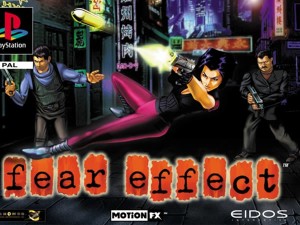In 1999, the survival-horror genre was at its peak, although teetering very close to toppling. Games with solitary protagonists stuck in creepy, isolating situations struggling to fight creatures and solve puzzles were pretty much everywhere, and developers sought ways to take the then “not-quite-as-worn-out” formula and make it fresh, novel, and new. Fear Effect and its follow-up prequel Fear Effect 2: Retro Helix were two of those games, a positively-reviewed experience involving gangs, corporate corruption, and a hell of a lot of demons, curses, and other all-out weirdness. They were a pretty great set of games for its time, and novel too: not only was the protagonist, Hana Tsu Vaschel, a strong, capable woman; Retro Helix very strongly implied that she was gay.
Eidos Interactive, the publisher, has an interesting history with its female protagonists. The most notable would be Lara Croft of the Tomb Raider series. It’s difficult to argue that, in its original context, Lara Croft was creating as a titillating experience, a female buxom beauty with all the right curves who could also kick ass, solve puzzles, and fight dinosaurs. It can’t be denied that Lara was made to be gawked at and mentally-pornified by its teenage demographic. To their credit, Eidos (and publisher Crystal Dynamics) spend several games developing her and her backstory, to mixed results, but ultimately making a character that was rather multidimensional. The result lead to her infamous reboot, a by-all-accounts excellent game with it’s own troubled PR history. Still, by modern standards, Lara Croft is considered one of the more successful and popular female protagonists in gaming history.
Eidos then published the first Fear Effect game by developer Kronos Digital Entertainment. In this game, Hana is, design-wise, just as voluptuous as Lara, but unlike Tomb Raider, which often referenced Lara’s sexuality in various, tongue-in-cheek ways, Fear Effect focuses less on Hana’s sex and more on her situation, which grew weirder and scarier with every pressing moment. The titillating aspect is still there, but not as strongly “in your face.”
But it’s in Retro Helix where things get interesting, both positively and negatively. We see Hana early in the game on a mission along side another female character, Rain Qin. As you progress through the first area, Hana and Rain talk, quibble and… flirt… with each other. It becomes more and more obvious that their relationship is beyond partnerships. It’s beyond platonic. Hana and Rain are lovers.
It’s a remarkable reveal if you think about it. The number of gay relationships in games is nil. In fact, the only ones that I can think of are the ones you can create in Dragon Age 2 and Mass Effect 3, and that had its share of controversy. I also believe that the Persona series tackle questions of sexuality of its cast of complex teenagers. But Fear Effect was before the internet hit its stride and way before people talked about games in any intellectual context. That the developers at Kronos Digital decided to imbue Hana and Rain’s relationship with romantic feelings that sound and feel relatively genuine is a massive surprise. I’m shocked (and yet I’m not) that this hasn’t caught on.
There is a caveat though: I say relatively because, well, it’s impossible to deny that the relationship in itself was designed to be even MORE titillating anything from Lara Croft. Look at these covers. Retro Helix is egregiously more eye-candy than it’s predecessor. And then there’s this scene, a scene that seems to be the whole raison d’être of making a “hot lesbian” protagonist duo in the first place:
Yeah, it’s cheap masturbatory fantasy at its finest, and sleaziest. It’s really the only scene in the game that’s really like this, though (EDIT: There are a few more, as pointed out by Anthony John Agnello in this Gameological article here – which I don’t fully agree with, but concede to on many points), and they do it as part of the mission, in a desperate moment when things don’t quite as planned and they need a quick distraction. Not to justify it though, since there’s probably a million ways to avoid this – I’m simply just trying to contextualize it.
That all being said, the game, overall, doesn’t overplay the gay angle. It’s not a “GAY AND PROUD OF IT” game, it’s not a “HAHA THEY’RE GAY” game, and it’s not (fully) a “DAMN, THAT GAY STUFF IS HOT” game. Hana and Rain are fairly fleshed-out characters with their own personalities. Hana feels strongly for Rain and when the game puts Rain in danger, Hana fights for her. Hana is as strong and fierce as your Samuses, your Crofts, your and Jades; Fear Effect rarely, if ever, drives the homosexuality in your face. Being gay has nothing to do with how Hana functions or how the player perceives her, and in that way, it’s a godsend.
A third game, Fear Effect Inferno, was in the works, but due to financial troubles, Eidos had to cancel it. It’s a shame, too, as it might have been fascinating to see where it would have taken that relationship, but then again, developers recently haven’t been doing the feminine sphere all that well, to say nothing of the barely-existent LGBTQ sphere. Still, for one very interesting moment, you played a gay person, and no one gave a shit because it was fun as hell.

Comments are closed